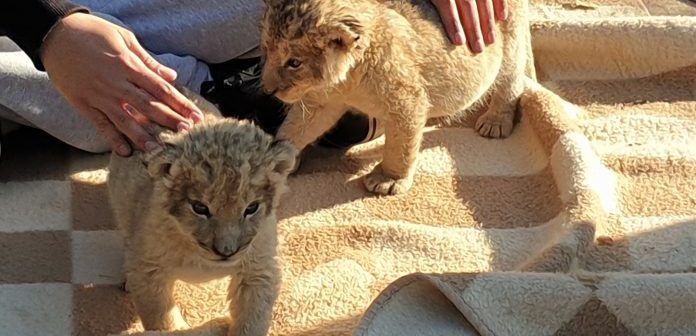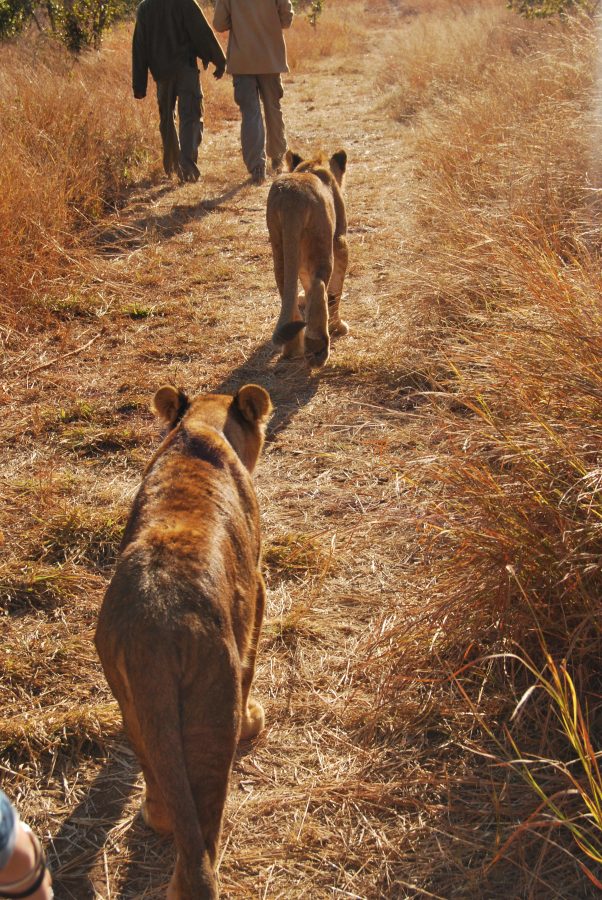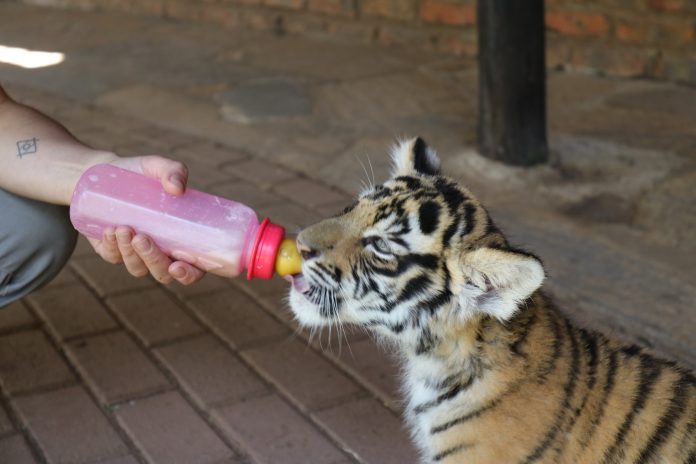BY LOUZEL LOMBARD STEYN - 19 NOVEMBER 2019 - THE SOUTH AFRICAN - FREE TO REPUBLISH
Interactions with all infant wildlife, walking with predators or elephants, interacting with predators and the riding of wild animals are no longer acceptable practices, according to the South African Tourism Services Association (SATSA).
The association’s Animal Interactions board committee announced at an industry briefing on 31 October that facilities in South Africa offering any such activities will no-longer be recommended to international operators or visitors.
The National Department of Tourism (NDT) have welcomed SATSA’s “commitment to protection of our wildlife and environmental resources,” says spokesperson Blessing Manale.
He says the guidelines support the existing National Standards for Responsible Tourism in “encouraging visitor behaviour that respects SA’s natural heritage and discouraged exploitative wildlife industries”.
Going forward, the NDT “will be looking into the guidelines in detail to ensure that we support emerging product owners to meet such standards”.
The NSPCA has also welcomed the move. “SATSA took the time to gain opinion from stakeholders countrywide and made a stand which we approve of,” says spokesperson Megan Wilson.
The research outcome has been structured as a practical and interactive tool to evaluate and select ethical animal interactions. It includes a ‘decision tree’ assessing such operations.
According to inbound tourism operator Private Safaris, SATSA’s ethical framework is a beacon for the industry.
“It has long pained us that there has been no clarity about what constitutes an ethical captive wildlife encounter in South Africa,” says CEO Monika Iuel.
“It is now incumbent on the industry – tour operators, any other booking channels, marketing organisations and media – to ensure that we educate the local and international traveller, and actively engage our business partners in order to work towards demand for unethical animal experiences being reduced and eventually stopped.”
The SATSA research briefing, aimed at “helping operators, product owners, tourists and everyday South Africans make good choices”, was attended by many operators within the industry.
One such wildlife facility is the Zululand Cat Conservation project in KwaZulu-Natal, previously known as the Emdoneni Cheetah Project. Owners Louis and Cecillie Nel re-evaluated their approach to tourism two years ago.
Working closely with SATSA, the Nels say they “decided to change the entire system to end all interactions. Visitor numbers dropped immensely, but we made the stance and pushed forward.
“We did our best. But now that we know better, we need to do better,” they say. They hope their example, along with the new SATSA guidelines, will prompt more businesses to do the same.
Other facilities haven’t been as susceptible to change. Joburg Lion Park general manager Andre La Cock says they “are deeply disappointed with the outcome of the SATSA guide” which will “definitely have a negative impact on our business”.
The Joburg Lion Park is currently a member of SATSA and will have to adhere to the new policies once they are implemented, or risk losing endorsement from the association.
The facility hosts activities like cub petting, walking with cheetah and lion, which “cannot be altered or ‘tailored’ to adhere to the SATSA guidelines because they have been categorized as outright unacceptable,” La Cock says. “These activities are the core of our business and make up more than 30% of our turnover – without which our business would not survive.”
Facilities falling outside SATSA’s new criteria “will no doubt fight tooth and nail to keep the status quo,” says sustainable tourism consultant Dr Louise de Waal. “However, the wider industry has been begging for guidance on what captive wildlife interaction activities are and are no longer acceptable.”
“It’s not natural for humans to interact with wild animals,” says Shadow Tourism Minister Manny De Freitas. “In South Africa we need to foster a ethical and natural approach to wildlife tourism. We should educate tourists, explaining why certain activities are no longer acceptable.”
SATSA hopes to implement the guidelines with full effect by the end of July 2020, after its AGM. “We hope to outline what the specific criteria for members who provide animal interactions will be at this meeting,” says SATSA CEO David Frost.
The radical new guidelines contain strict disqualifying criteria for the following:
Performing animals (all types of animals, including elephants, predators, primates, birds etc.)
Tactile interactions with all infant wild animals
Tactile interactions with predators or cetaceans (any interaction with land predators or aquatic mammals)
Walking with predators or elephants
Riding of animals (including elephants, ostriches etc.)
Additionally, the guidelines warn operators and tourists against facilities that may be involved in any illegal trade, trading in body parts, canned hunting, breeding, misleading advertising and any lack of transparency.
“Primarily, the research outlines a ‘home-grown’ approach to a complex problem, one which draws a line in the sand – moving the SA tourism industry forward in terms of responsible and sustainable practices,” Frost says.
Original article: https://www.thesouthafrican.com/opinion ... -industry/
Radical changes rattle the cage of SA’s wildlife interaction industry
-
Klipspringer
- Global Moderator
- Posts: 5858
- Joined: Sat Sep 14, 2013 12:34 pm
- Country: Germany
- Contact:
- Lisbeth
- Site Admin
- Posts: 67166
- Joined: Sat May 19, 2012 12:31 pm
- Country: Switzerland
- Location: Lugano
- Contact:
Re: Radical changes rattle the cage of SA’s wildlife interaction industry
Finally an ethical move to safeguard wild animals against the human greed to take advantage of anything that yields a monetary profit. There are even some courageous people following the guidelines albeit they knew that the step would result in a lower income. Hats off to Louis and Cecillie Nel
"Education is the most powerful weapon which you can use to change the world." Nelson Mandela
The desire for equality must never exceed the demands of knowledge
The desire for equality must never exceed the demands of knowledge
- Lisbeth
- Site Admin
- Posts: 67166
- Joined: Sat May 19, 2012 12:31 pm
- Country: Switzerland
- Location: Lugano
- Contact:
Re: Radical changes rattle the cage of SA’s wildlife interaction industry

Conservation Leaders Urge UN World Tourism Organisation: Curb Wildlife Exploitation
BY LOUISE LOMBARD STEYN - 1ST JUNE 2020 - SA PEOPLE
The thing with keeping wildlife in cages is that it almost always turns around to bite you in the behind. The current global pandemic is case-in-point and going forward, a new perception of sustainable tourism is key, especially in South Africa. By environmental writer Louzel Lombard Steyn
Conservation groups from South Africa and around the globe have called on the United Nations World Tourism Organisation (UNWTO) and their Global Tourism Crisis Committee to phase out close-contact wildlife encounters and entertainment practices in tourism to help build a more resilient and sustainable industry going forward…. writes environmental writer Louzel Lombard Steyn.
This as the world continues to navigate the aftermath of the emergence of a novel zoonotic disease. It is believed that COVID-19 originated at a wildlife market in Wuhan, China, where it was transmitted from bats to endangered pangolins and then to humans. It’s not the first time such a human-wildlife transmission has occurred and, as experts predict, it won’t be the last.
As a country dependent on tourism for economic stability and employment, South Africa’s tourism industry simply won’t survive another catastrophic zoonotic disease spill-over.
To this end, a group of nearly 240 international organisations, including 13 from South Africa, have called on the UNWTO’s Global Tourism Crisis Committee partners to rethink wildlife entertainment in tourism going forward.
Travel and tourism heavyweights such as Airbnb, booking.com, the Dutch association of travel agents and tour operators ANVR, Intrepid Travel, as well as the Southern Africa Tourism Services Association (SATSA), have all backed the open letter sent by the World Animal Protection (WAP) on the 28th May.
The letter asks for a pro-active, precautionary and responsible approach in ‘preparing for tomorrow’ by phasing out the use of captive wildlife for tourist entertainment. The proposal hopes to safeguard both tourists and tourism employees while shaping an authentic and ethical industry.
A new wave of wildlife tourism
Wildlife interactions are an integrated part of tourism, accounting for up to 20-40% of international tourism globally. However, as the letter states, the industry is also a reservoir for new zoonotic diseases and relies on keeping wild animals in closely confined spaces to be handled, fed, posed with, walked with, ridden or watched as they perform. Often, the animals involved also suffer due to poor welfare conditions, which undermines their immune systems and accelerates disease emergence and spread.

While the era of circuses and zoos seems to be losing traction, a new, more nuanced wave of exploitation continues in the online realm, where ‘wildlife fame’ is on the rise.
Between 2014 and 2017, the number of wildlife selfies posted on Instagram increased by 292%. More than 40% of these involved hugging, holding or close-contact interactions with wild animals. Apart from the immediate dangers, such as losing an arm or being mauled to death, “the risk of transmitting potential zoonosis must be considered a significant Public Health risk,” says Nick Stewart, Global Head of Wildlife Campaigns for WAP.
Particularly concerning is how many of these interaction facilities and individuals operate under the cloak of ‘wildlife rescue operations’ or ‘rehabilitation centres’, to woo tourists, fans and volunteers. The recent Netflix hit-series Tiger King is but one example and in South Africa, there are many ‘Joe Exotics’ keeping wildlife in captivity in the name of ‘education’, ‘raising awareness’ and ‘conservation’.

In reality, the practice romanticises close physical contact with wildlife and jeopardises all ethical and well-being regulations aimed at keeping humans and wildlife safe.
According to Blood Lions director Pippa Hankinson, faux-conservation tactics pose a great challenge to creating a tourism industry which is genuinely sustainable and safe. Blood Lions is one of the co-signatories of the UNWTO joint letter.
The current pause in the global tourism industry creates an opportunity to take a step back and implement rational measures to avoid all of the above. “Decisive action would signal the tourism sector’s commitment to not only recover, but to build back better toprotect the health of tourists and tourism workers globally,” Stewart says.
Tomorrow’s Tourism
SATSA have already started to address some of these issues with their Animal Interaction Charter, encouraging facilities to do away with interactions, breeding and trading. According to Keira Powers, SATSA Responsible Tourism Committee Chair, they aim to be on the right side of history.
“Wildlife remains the bedrock of South Africa’s tourism, and we have the privileged position of offering tourists engagements in authentic settings. A UNWTO-led tourism recovery plan with strong, ethical recommendations around captive wildlife will bolster local tourism authorities’ efforts to create a more sustainable, ethical and responsible tourism industry around the globe”, Powers says.
Cape Town’s official destination marketing organisation Cape Town Tourism already opposes all human-wildlife interactions. However, says mayoral committee member for economic opportunities and tourism in Cape Town James Vos, it is out of their hands to stop such facilities from operating. “It’s clear that cub petting and other wildlife entertainment practices will continue, despite their controversy, unless they are banned for good.”
There has never been a bigger need or better grounds for such drastic action; to proactively minimise the risk of future pandemics, to protect the health of tourists and tourism workers and to secure the tourism industry’s future sustainability.
“We need to ask the question however why we are still having this debate”, Hankinson says. “More than three years ago, CEO of South African Tourism, Sisa Ntshona, stated publicly that SA Tourism does not promote or endorse any interaction with wild animals such as the petting of wild cats, interacting with elephants and walking with lions, cheetahs and so on, but nothing concrete has changed since.”
In South Africa, wildlife interactions and entertainment in tourism remains a sticky inter-departmental web over which our national Tourism Department has limited authority, even though they support SATSA’s long-term vision regarding wildlife interactions in tourism, says spokesperson Blessing Manale.
The Department is not the regulatory authority and cannot simply ban wildlife interactions in tourism, he says. “That function remains public health or environmental management matter, with the relevant authorities being the Departments of Health and Environment, Forestry and Fisheries.”
He says the Department continues to work with industry partners to strengthen efforts in support of sustainable and ethical tourism practices wherever they are able. Tourism Minister Mmamoloko Kubayi-Ngubane has also rolled out a tourism recovery plan, stating that transformation should be an integral part of the COVID-19 bounce back. “Any recovery plan that is not in line with a coordinated, global effort will be a futile exercise,” she says.
A ‘coordinated global effort’ is what the open letter to the UNWTO and the nearly 240 signatories ask for; to ‘grow back better’ in building a resilient and safe tourism industry for the future – for both humans and wildlife.
In April, the (UNWTO) released a set of recommendations calling for urgent and strong support to help the global tourism sector not only recover from the unprecedented challenge of COVID-19, but to ‘grow back better’. According to the conservation groups, the out-phasing of captive wildlife entertainment supports the implementation of these recommendations to help mitigate the socio-economic impact of COVID-19 and accelerate recovery.
Original article: https://www.sapeople.com/2020/06/01/con ... loitation/
"Education is the most powerful weapon which you can use to change the world." Nelson Mandela
The desire for equality must never exceed the demands of knowledge
The desire for equality must never exceed the demands of knowledge
- Richprins
- Committee Member
- Posts: 75997
- Joined: Sat May 19, 2012 3:52 pm
- Location: NELSPRUIT
- Contact:
Re: Radical changes rattle the cage of SA’s wildlife interaction industry
Oh please. Covid is now going to be added to the armoury of all those with an agenda... 
I don't see mention from all these "organisations" that they will pay the salaries of those who lose their jobs at animal interaction centres?
I don't see mention from all these "organisations" that they will pay the salaries of those who lose their jobs at animal interaction centres?
Please check Needs Attention pre-booking: https://africawild-forum.com/viewtopic.php?f=322&t=596


